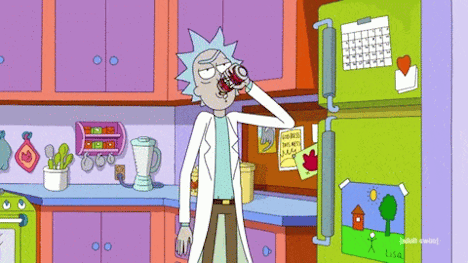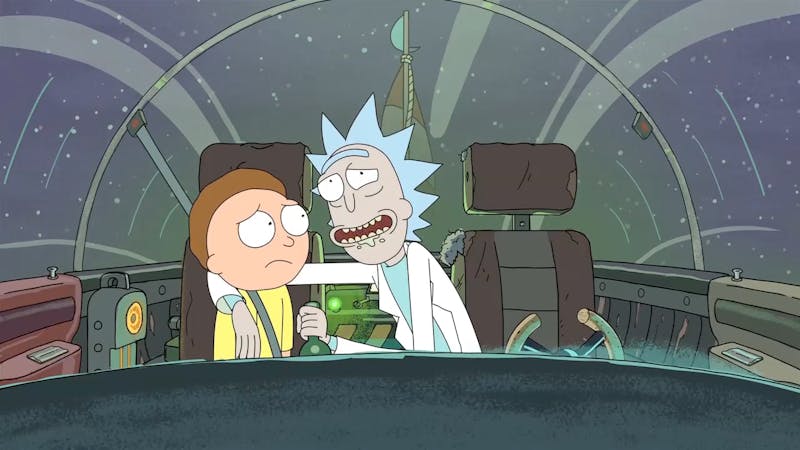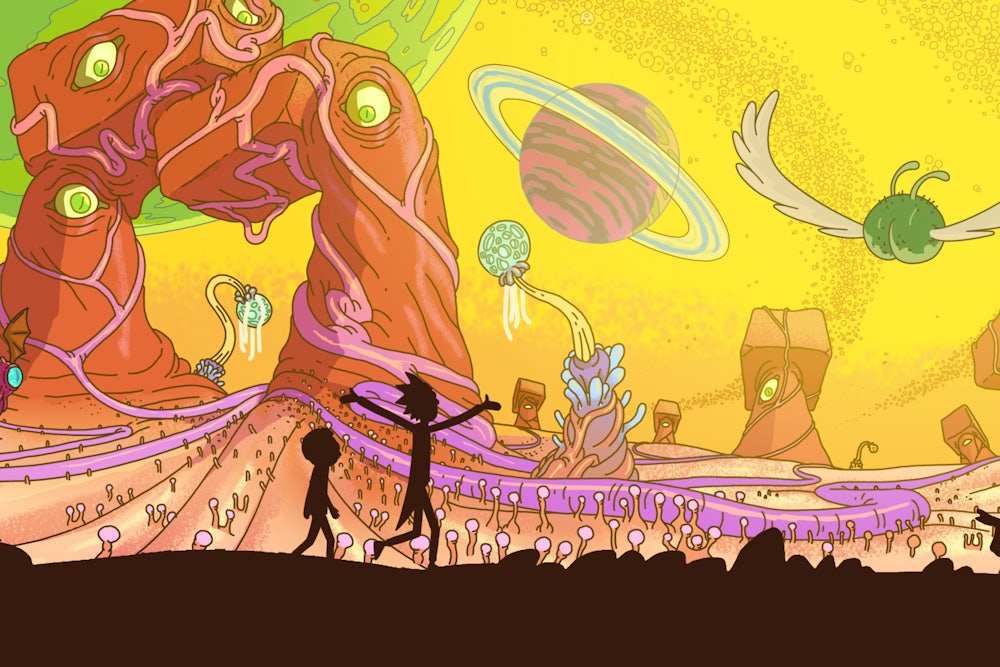To a certain set of culturally au courant kids in the late 1990s and early 2000s, the world was nothing if not a big joke. We weren’t original, of course; the postmodernists had cornered the market on irony decades before, and, unlike us, actually had something to say. But we were removed from the New Sincerity championed by David Foster Wallace, and even further removed from his saccharine offspring. We grew up in the age of the knowing smirk, of the hipster with his cultivated handlebar mustache. Perhaps this is why the Adult Swim cartoon Rick & Morty, whose third season is expected to launch this spring, feels significant. It can be seen as carving a new path for millennial expression that embraces both cynicism and schmaltz.
You wouldn’t know this from reading the reviews, which usually focus on the show’s zany plot lines and off-the-wall humor. Most episodes consist of Rick Sanchez, a preternaturally gifted scientist, dragging his timid 14-year-old grandson Morty (both voiced by co-creator Justin Roiland) along for madcap, sci fi–inflected adventures. One episode finds them lounging on the couch flipping through strange and hilarious channels on inter-dimensional cable. In another, they cause the destruction of the universe via a hastily synthesized love potion that turns those infected into giant insectoid monsters Rick dubs “Cronenbergs,” a reference to the grotesque creatures made famous by the films of the eponymous director.
In many ways, however, Rick & Morty is a traditional sitcom. Its animated half-hour format draws liberally from The Simpsons, which creators Roiland and Dan Harmon (Community) cite as a major influence. Centered on a middle-class, suburban American family, it hits all the usual beats: High school drama, the pitfalls of raising children, the stresses of employment (or lack thereof), sibling rivalry, and the intricacies of a troubled marriage. Rick may be a genius, but he’s also an unapologetic drunken asshole, unmoored from tact, who lays bare the family’s myriad problems with benumbed precision. Almost everything Rick barks at his family in between labored belches rings sad and true, and we laugh because what else is there to do?

Hovering over the show is the spectre of creeping doom. The silent terror in the darkness, the something lurking just beyond the razor’s edge where the light stops, is as much a part of the show’s identity as Rick’s godlike genius. Whether it’s a Lovecraftian monster of the deep, or the even more unnerving possibility of nothing at all, Roiland and Harmon have taken great care to thread cosmic horror into the very fabric of Rick & Morty.
Rick & Morty owes a lot to Lovecraft. The creators pay homage to the author’s most famous creation with a Cthulhu-like beast that soars through the opening title sequence. But if Lovecraft evokes existential dread through his brand of monster-flick nihilism, Rick & Morty counters it with a deep humanism. In the episode “Something Ricked This Way Comes,” for example, Rick encounters a man named Mr. Needful, who is later revealed to be the actual devil (voiced in a delightful turn by Alfred Molina). Needful opens a shop full of mysterious antiques that promise great benefits, but come at an unseen cost. There is a love potion that renders its user impotent, a facial cream that beautifies but blinds, a microscope that mentally handicaps. Through the power of science, Rick builds a gadget that identifies and removes Needful’s curses. He has neutralized a tired horror trope and asserted the utility of science over magic, truth over deceit.
There’s another reason, however, that Rick decides to engage Needful: His other teenage grandkid, Summer (voiced by Spencer Grammer), has landed a job at the antiques shop. His feud with Needful serves as the perfect cover for spending time with his granddaughter. After putting the science smackdown on Needful, Rick and Summer extend their quality time together by beefing up in the weight room, then putting the physical smackdown on a bunch of stock baddies—a neo-Nazi, an abusive pet owner, a Westboro Baptist Church member—to the tune of DMX’s “X Gon’ Give It to Ya.” This is family time, Rick & Morty style.
Rick is often set up as a selfish prick, only for the show to pull a reversal. At the episode level, Rick’s incessant cynicism affords his scattered displays of sincerity and kindness extra resonance. At the season level, these moments work to build Rick into a complex character who we relate to despite his unhinged genius and bad behavior. Even from the first episodes, the show feels like it’s building toward a major reveal. We get that grand gesture at the end of the second season when Rick (SPOILERS!) decides to sacrifice his freedom for the safety of his family.
Unbeknownst to most earthlings, the Milky Way is ruled by the Galactic Federation, which Rick finds tyrannical. Earth is one of only a handful of habitable planets not yet under the Federation’s thumb. Rick has been fighting with a small band of rebels for most of his life to keep it that way. When the Federation ambushes Rick at a wedding and forces his family into hiding, he realizes that a return to normal life for his loved ones will require his surrender. In a five-minute closing sequence, Rick arranges for his capture while Nine Inch Nails’s “Hurt” swells in the background without a trace of irony.

This is sentimental, yes. But what Roiland and Harmon are doing is asserting the value of sentimentality, cloaked in Lovecraftian postmodernism and delivered by one of the most sardonic characters in the history of television. Rick & Morty is like the alien lovechild of Albert Camus and Steven Spielberg. Or to paraphrase famed jurist Charles Black, the curves of callousness and sincerity intersect at their respective maxima.
Morty, an ostensibly dim-witted neurotic, plays the straight man, the audience’s surrogate. He’s mostly there to react to Rick’s deranged schemes. But there is revelatory power in his role, too. Rick’s higher-plane-of-existence intellect is unfazed by the wonders of the universe. Morty, on the other hand, with his feeble mind and warm heart, is a cosmic lab rat forced to gaze long into the abyss. What he sees is transformative.
When the duo accidentally destroys the world by unleashing an army of Cronenbergs, they escape to another dimension, one that is identical to theirs. Before they can seamlessly slip into this alternate reality and resume normal life, they must first dispose of their doubles. Dragging his own mangled corpse into a shallow grave of his own digging traumatizes Morty. Understandably so. But it also grants the 14-year-old rare perspective.
“Every morning, Summer, I eat breakfast 20 yards away from my own rotting corpse,” Morty tells his shocked sister. “Nobody exists on purpose. Nobody belongs anywhere. Everybody’s going to die.” He then adds, “Come watch TV.”
This passage echoes a passage from Jean-Paul Sartre’s 1938 novel La Nausée: “Every existing thing is born without reason, prolongs itself out of weakness, and dies by chance.” The key, however, is that despite these bleak truths, which the show accepts, full stop, Morty’s pronouncement never implies hopelessness. On the contrary, these truths are empowering. They make life precious. They give meaning to hope.
